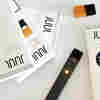
Airway-irritating acetals seem to form in some types of vape juice even without heat, researchers find — likely a reaction between the alcohol and aldehydes in the liquid.
Gabby Jones/Bloomberg via Getty Images
hide caption
toggle caption
Gabby Jones/Bloomberg via Getty Images

Airway-irritating acetals seem to form in some types of vape juice even without heat, researchers find — likely a reaction between the alcohol and aldehydes in the liquid.
Gabby Jones/Bloomberg via Getty Images
Scientists don't know much yet about the long-term effects of "vape juice," the liquid used in e-cigarettes and vaporizers. But researchers analyzing the liquid and the vapor produced when it's heated say some kinds of e-liquids are reacting to form irritating chemicals calledacetalswhile they're sitting on shelves.
More than3 million young people, as well as some adults, use e-cigarettes, according to the Centers for Disease Control and Prevention. Many of them could be inhaling these compounds regularly. And that could be irritating or even damaging to their lungs, Yale and Duke university researchers suggest.
Thestudy published Tuesdaylooked specifically at eight flavors of Juul e-liquids, which contain a different mixture of solvents than many other brands of e-liquid. These new findings build on similar work the research grouppublished in October 2018on other brands of e-liquids.
Acetals are formed from alcohol and aldehydes, chemicals used to flavor and perfume foods and other commercial products. While some areconsidered harmful, many are generally recognized as safe to eat and touch, saysHanno Erythropel, the study's lead author and an associate research scientist at Yale's chemical and environmental engineering department.
Still, little is known about the effects of aldehydes and acetals when inhaled this way, Erythropel adds, although some research has shown that the acetals canirritate airwaysmore strongly than thealdehydesthey were formed from. And that irritation can prompt an inflammatory response in the respiratory system.
Unlike small amounts of acetals you get through food, Erythropel says, with vaping, "you are breathing this in. We didn't imagine people would be inhaling flavor compounds at the level they are now. We have very little information."
At this point, the FDA doesnot requiree-liquid manufacturers to submit or list all the ingredients in their products. So the Yale chemists had to "reverse-engineer" the e-liquids by separating and quantifying their chemical ingredients.
Via this process, the researchers detected the presence of acetals in one of the eight Juul flavors they tested: Crème brûlée. This flavor, which uses vanillin for a vanilla-like smell, contains relatively high levels of vanillin acetals, the scientists say. Other flavors might also contain acetals and aldehydes, they say, but they didn't test in this study for all the possible aldehydes.
Julie Zimmerman, the study's principal investigator and a professor in the chemical and environmental engineering department at Yale, stresses that much more research needs to be done before drawing conclusions about the safety of e-liquids. Such research needs to take into consideration the possibility of chemical reactions between different chemical constituents of e-liquids, she says, which can lead to altered products.
Dr. Robert Jackler, a Stanford professor inotorhinolaryngologywho has studied the rapid rise of e-cigarettes among youth, says the paper "contributes to the increasing body of evidence documenting toxicological effects of e-cig vapor by specifically testing JUUL's sweet and fruity flavors, which are so popular among teens." Erythropel is careful to note, however, that any flavored product may contain aldehydes — even a generic 'tobacco-flavored' one.
This discovery and others like it suggest there may be long-term health consequences for young people, says Dr.Christina Sadreameli, assistant professor of pediatrics at Johns Hopkins University and pediatric pulmonologist. Sadreameli says e-cigarette manufacturers have long positioned vaping as a far safer alternative to cigarettes, with few health effects.
But "this notion [that] 'it's just water vapor and nicotine and flavorings' is very untrue," she says. "E-cigarette vapor contains a lot of harmful chemicals, heavy metals [and] ultrafine particles."
The discovery of acetals in e-liquids, she says, "raises yet another reason to worry about what is in the vape aerosol and how that can harm the developing lung."
Asked about the study's findings, Lindsay Andrews, a Juul spokesperson, says that the acetate levels the researchers considered harmful exceeded "real world" exposures from Juul pods. Someone would likely need to consume seven or more pods of e-liquid in a day to meet the threshold the researchers considered harmful, Andrews says.
Though little is known about the long-term consequences of vaping, some health scares have started to surface. Last week, the Children's Hospital of Wisconsin announced thateight teenagers had been hospitalizedwith "seriously damaged lungs" over the month of July.
The symptoms that led to their hospitalization included "shortness of breath, fatigue, chest pain, cough and weight loss," according to the hospital. Though all the teens improved with treatment, and the exact cause of their symptoms remains unknown, all had reported vaping in the weeks and months prior to being hospitalized.
Zimmerman, Erythropel and their colleagues hope to do more research on the health effects of inhaling acetals. But it will likely be many years before health experts understand the full consequences of acetal inhalation and vaping more broadly, Jackler says.
"Teens acquiring the habit of daily use of e-cigarettes, driven by nicotine addiction, may well suffer adverse health consequences over time," the physician says. "This means we will not know the full impact of the teen e-cigarette epidemic for decades."
Susie Neilson is an intern on NPR's Science Desk. Follow her on Twitter here: @susieneilson.
Read More





No comments:
Post a Comment